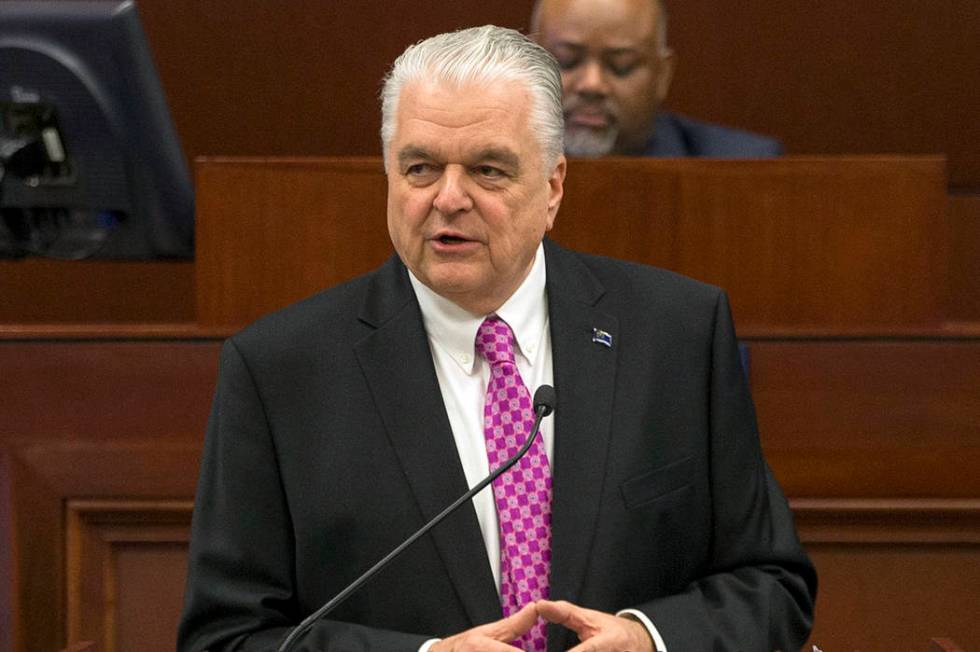Chamber: Union rights for state workers could carry big price tag

CARSON CITY — Pushing back on a bill to give state employees the right to engage in collective bargaining, the Las Vegas Metro Chamber of Commerce has released a study saying the move could add $1.7 billion to the annual cost of state government in 20 years.
The chamber’s analysis comes as the bill in question faces its first vote by lawmakers. Senate Bill 135, the subject of a marathon four-hour committee hearing last week, is scheduled for a work session and possible vote Wednesday before the Senate Government Affairs Committee. If it passes, it would move to the Senate floor.
Chamber representatives testified against the bill last week, citing concerns that higher government spending for employees could shift resources away from other priorities, such as education. They also cited the potential impact on the broader state economy and on wages paid in the private sector.
Both Gov. Steve Sisolak and the Democratic majority in the Legislature have endorsed the move. Sisolak, in his first state of the state address and budget, pledged his support for collective bargaining and proposed 3 percent wage increases for state workers.
The chamber’s analysis, prepared by RCG Economics, a Las Vegas economic research firm, used regression analysis to determine future potential costs of collective bargaining, based on 55 years of historical data from all states and factoring in variables such as the effect of right-to-work laws, state personal income and which political party was in control of government.
High future costs
The study’s best estimate says if collective bargaining had been in effect starting in 2016, the annual growth in spending, in 2012 dollars, would be about $29 per capita per year.
In 2036, the cumulative per capita increase would be $579 to $596 higher per capita than in 2016. That equates to between $1.7 billion and $1.75 billion, based on a steady state population of just under 3 million. The per capita increase could be higher if the potential impact on local public employees is added to the result.
The report said the increase would stem from workers’ benefits such as insurance, paid time off or pensions rather than higher salaries or hiring more state workers “to satisfy growing demands by taxpayers.”
“This report shows that allowing collective bargaining for state employees would add significant new ongoing annual costs to the state budget and would likely take resources away from other important priorities including education, human services, public safety, infrastructure, and health care,” Hugh Anderson, chairman of the chamber’s Government Affairs Committee, said in a statement accompanying the report’s release.
Labor unions disagree
Union representatives pushed back on the study. In testimony at last week’s hearing, they noted that the pending bill only authorizes state workers to bargain collectively for wages and benefits but neither creates bargaining units nor sets labor agreements. Contracts would still be subject to negotiation by the executive branch and approval by the Legislature.
In an emailed statement, Harry Schiffman, an electrician at UNLV and president of AFSCME Local 4041, which represents about 17,000 state employees, said the chamber represented big-business interests and was “shopping a bogus study to deny state employees the opportunity to improve state services and advocate for their community.”
State employees in 28 states and the District of Columbia have collective bargaining rights. A review of federal government data on state employee wages and cost of living puts Nevada in the middle of state rankings for each category.
Census wage data shows that Nevada’s full-time state workers ranked 21st for average wages among states in 2013, falling to 26th in 2015 through 2017. Data from the Bureau of Economic Analysis put the state’s cost of living in 2016 at 23rd overall among states, slightly below the national average.
Contact Bill Dentzer at bdentzer@reviewjournal.com or 775-461-0661. Follow @DentzerNews on Twitter.